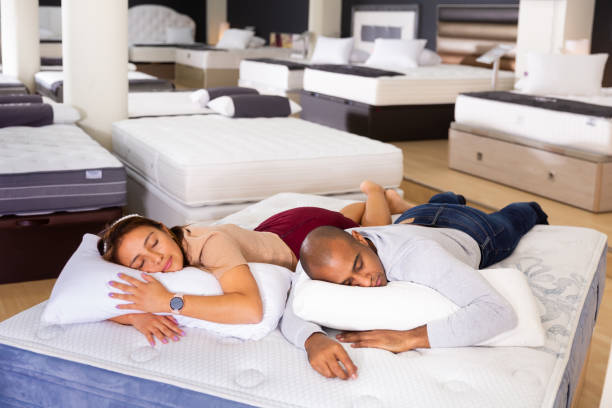Introduction

Introduction
Are you having trouble sleeping due to restlessness and discomfort at night? Your mattress may be the culprit. Firmness and other contributing factors are critical in achieving a comfortable and peaceful sleep. The right level of firmness will help reduce tossing and turning and lead to a good night's sleep.
In this post, we will discuss how the firmness of a mattress affects your movement while sleeping. We will offer advice on choosing the best level of firmness depending on your sleep habits and provide an overview of mattresses that effectively reduce motion. We aim to help you sleep better, so you can wake up feeling refreshed. To start, let's explore the correlation between firmness and movement and how to determine the ideal firmness for your preferred sleeping experience.
What is the effect of Mattress Firmness Movement in Bed?
The impact of mattress firmness on one's movement level while in bed can differ significantly among individuals. The type and amount of motion that a sleeper experiences while lying down is an important factor in finding the perfect balance between comfort and support. Finding the right mattress firmness that best supports your sleeping needs is essential.
Explanation of the connection between mattress firmness and movement

It's important to understand the connection between mattress firmness and movement. When finding the perfect balance of mattress firmness, it is essential to consider how this factor affects your sleep quality.
Mattress firmness can directly affect body movement while sleeping. A softer mattress will provide more cushion and support, allowing you to sink into the mattress more. However, the more you sink, the greater the friction and effort required to reposition. On the other hand, a firmer mattress will provide support but with less cushion resulting in less friction and effort required to move.
It is important to note that too much movement friction between the body and bed surface leads to tossing and turning in bed throughout the night, which can decrease the quality of sleep. Too little movement can lead to soreness and stiffness due to insufficient movement and cushioning. Finding a mattress with the perfect balance of firmness is key to achieving restful sleep.
Factors to consider when choosing mattress firmness
When selecting a mattress, it's important to consider the type and intensity of your movements during sleep. Different mattress firmness levels will support different body types, sleeping positions, and activities.
A softer mattress that offers additional cushioning for your hips and shoulders could be helpful if you prefer sleeping on your side. In contrast, if you sleep on your stomach, you may find a firmer mattress that gives more support to your lower back beneficial.
Examples of top-rated mattresses for movement control

When finding the perfect balance of mattress firmness for movement in bed, some top-rated mattresses can provide an ideal level of support. Examples include:
Casper Wave Hybrid Mattress
This mattress is designed with targeted zones that help to create a balanced sleeping surface. It is made with layers of foam, springs, and gel pods that help to distribute weight evenly and minimize motion transfer.
Layla Hybrid Mattress
This mattress is designed with memory foam and coils that help absorb movement while providing targeted support. It also has cooling technology built-in to keep the sleeper cooler while they sleep.
Sattva HD Mattress
This mattress is designed with individually wrapped coils that help to reduce motion transfer and provide targeted support. It also has a layer of memory foam along the top for additional comfort.
How a mattress's firmness affects movement in bed
Mattress firmness affects the way we sleep and move in bed. A mattress that is too firm can restrict movement and cause unnecessary discomfort. On the other hand, a mattress that is too soft may not provide enough support for a restful night's sleep. Achieving a comfortable and firm sleeping surface is crucial for good quality sleep.
When it comes to movement in bed, the firmness of a mattress can make a big difference. A firmer mattress is better for sleepers who move around, as it provides more support and stability during the night. This helps keep them from sinking too far into the mattress, allowing them to move more easily. Soft mattresses, on the other hand, can cause sleepers to sink and be unable to move freely in bed.
What Level of Firmness Should My Mattress Be?
Choosing the right mattress firmness is a highly individual decision as it varies based on personal preferences and body type.
Sleep Positions
When you have a mattress, it's crucial to factor in your sleeping position. If you like sleeping on your stomach or back, it is better to use a firmer surface to ensure that your spine stays aligned correctly. Alternatively, a softer mattress with greater cushioning for your hips and shoulders will likely be more comfortable if you are a side sleeper. If you switch between all three positions while sleeping, a medium-firm mattress may be ideal.
Weight
Your weight is also a key factor in finding the right mattress firmness. Generally, heavier people will benefit from firmer mattresses than lighter people. A firm mattress's extra support helps keep the spine aligned and can prevent sagging over time. On the other hand, lighter sleepers may find firmer beds too hard and uncomfortable, and may do better with a medium-firm mattress.
Motion Transfer
Finally, motion transfer is an important factor to consider when choosing the perfect mattress firmness. Many couples appreciate slightly softer mattresses, as they can help reduce disturbances from your partner's movements throughout the night.
To achieve a restful night's sleep, it's crucial to determine the appropriate mattress firmness level. By researching, you can discover the ideal combination of comfort and support that suits your needs.
Mattress Firmness By Type
Several mattresses are available to meet individual sleepers' needs regarding mattress firmness. Here is a quick breakdown:
Innerspring
Innerspring mattresses are the most commonly used type of mattress in America. They have a structure made of steel coils, which provide support and comfort to sleepers. Additionally, innerspring mattresses are typically firm enough for people who want somebody contouring due to their construction.
Memory Foam
If you're looking for a mattress that molds to your body and offers pressure relief, memory foam mattresses are a great option. They have a foam layer that adjusts to your body shape and provides support without causing any pain or discomfort.
Latex
Latex mattresses are crafted from natural latex rubber and offer a medium-firm sensation that contours your body and relieves pressure. Unlike memory foam, they have more bounce, making them a favorite for those who desire comfort and support while sleeping.
Hybrid
A hybrid mattress combines innerspring coils with memory foam or latex layers. Hybrid mattresses provide a good balance of comfort and support, making them a great choice for those looking for a firm and comfortable mattress.
To achieve a comfortable balance of firmness and motion on your bed, it's crucial to consider your unique requirements and likings. This will help you select the perfect mattress that provides enough support for a restful night's sleep.
How to Choose a Mattress for Firmness Affects Movement in Bed
You should consider a few things when finding the perfect balance of mattress firmness and movement in bed. Most importantly, knowing your personal preferences regarding mattresses is key.
Are you someone who likes a firm mattress that provides maximum support? Or do you prefer something softer so your body can sink into it? Understanding your needs is important to make the best decision for your sleep. The type of mattress that you choose will also have an impact on movement in bed.
Firmer mattresses tend to provide more support, meaning they won't move as much when someone moves around in bed. However, this type of mattress may be too firm for some people and cause discomfort. Softer mattresses are more likely to shift when someone is moving around in bed, but they can provide more cushioning support.
What are the benefits of a firm mattress?
There are five major benefits of using a firm mattress:
1. Improved posture – A firm mattress provides better support for your spine, which keeps it properly aligned and helps prevent back pain. This can also help improve the overall quality of sleep.
2. Better joint comfort – Firm mattresses offer more resistance than softer ones, allowing you to find the perfect balance between support and comfort. This can be beneficial for those who suffer from joint pain, as it helps to reduce pressure points which can cause discomfort.
3. Reduced motion transfer – Motion transfer occurs when one partner moves, causing the mattress to vibrate and disturb the partner's sleep. A firm mattress provides more stability and reduces motion transfer so you can rest peacefully.
4. Reduced risk of overheating – Soft mattresses trap heat and cause uncomfortable sleeping temperatures. A firm mattress is more breathable and helps keep the bed cooler, allowing for a better night's sleep.
5. Longevity – Firm mattresses are more durable and provide better support over time, making them a great long-term investment.
FAQ's
How do I know what firmness level is right for me?
It depends on your personal preferences and sleeping position. Generally, back sleepers prefer firmer mattresses; side sleepers prefer softer mattresses, and stomach sleepers prefer medium-firm mattresses.
Can mattress firmness affect how much I move around in bed?
The level of firmness of a mattress can impact your movement while in bed. If the mattress is too soft, you may sink in too much, making it difficult to move around. On the other hand, if the mattress is too firm, it can create pressure points that lead to discomfort.
How do I test the firmness of a mattress?
You can test the firmness of a mattress by lying on it in your preferred sleeping position for a few minutes. Pay attention to how it feels and if it provides enough support and comfort.
What if my partner and I have different firmness preferences?
Consider a mattress that allows you to customize the firmness on each side, or look for a mattress with a medium-firm level that can accommodate both of your preferences.
How long does it take to adjust to a new mattress's firmness?
It can take a few weeks to adjust to a new mattress's firmness, especially if you're used to a completely different level of support.
Conclusion
In conclusion, mattress firmness plays a crucial role in the quality of sleep and the level of movement experienced in bed. To sleep well, it's crucial to find a mattress that is both supportive and comfortable. When selecting a mattress firmness level, it's important to consider your sleep position, weight, and how much movement you make during the night to ensure it meets your individual needs.
Soft mattresses provide support and more cushioning. However, these will create greater friction with more effort required to reposition. Firmer mattresses also provide support but with less cushioning resulting in less effort required to reposition. Because the body does not sink in as deeply., there is less friction to overcome. Top-rated mattresses such as the Hybrid Mattress, Layla Hybrid Mattress, and Sattva HD Mattress can provide an ideal level of support and minimize motion transfer. Having a comfortable and supportive mattress can enhance the quality of your sleep, boost your energy level, and improve your overall health.

